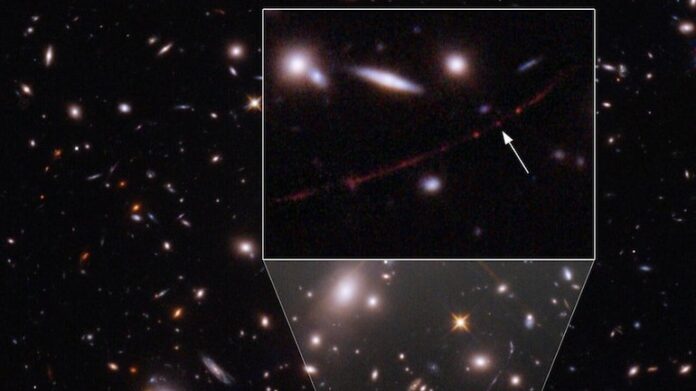| Translate This News In |
|---|
The light from the furthest star ever observed has been caught by the Hubble Space Telescope. The star called Earendel existed within the first billion years following the universe’s inception in the big bang, according to a NASA press release.
“Because the newly discovered star is so far away and its light has taken 12.9 billion years to reach Earth, it looks to us as though the universe were just 7% of its current age,” NASA said in a statement released on Wednesday.
RECORD BROKEN: Hubble observed the farthest individual star ever seen!
This extraordinary new benchmark detected light from a star that existed within the first billion years after the universe's birth in the big bang.
Find out more: https://t.co/2ivkk1iqz3 pic.twitter.com/X7qcijwx24
— Hubble (@NASAHubble) March 30, 2022
In old English, Earendel was a “morning star.”
A star spotted by Hubble in 2018 held the previous record, according to NASA. According to NASA, that star existed when the universe was around 4 billion years old, or about a third of the age it is now.
Nature has released an article about the discovery.
“Studying Earendel will open a window into a moment in the universe that we don’t know about, but that led to everything we know today.” “It’s as if we’ve been reading a fantastic novel, but we’ve just gotten to the second chapter, and now we’ll get to see how it all started,” said Brian Welch, the study’s lead author at Johns Hopkins University.
Earendel is at least 50 times the mass of the Sun and millions of times as brilliant as the brightest stars known, according to the research team.
The team had to magnify WHL0137-08, the galaxy cluster where it is found.
NASA’s James Webb Space Telescope will be observing the star shortly. “Because its light is stretched to longer infrared wavelengths due to the universe’s expansion,” the research team explained, Webb’s exceptional sensitivity to infrared light is needed to learn more about Earendel.
According to Dan Coe, a co-author of the paper, Webb will confirm that Earendel is a star and measure its brightness and temperature.


















